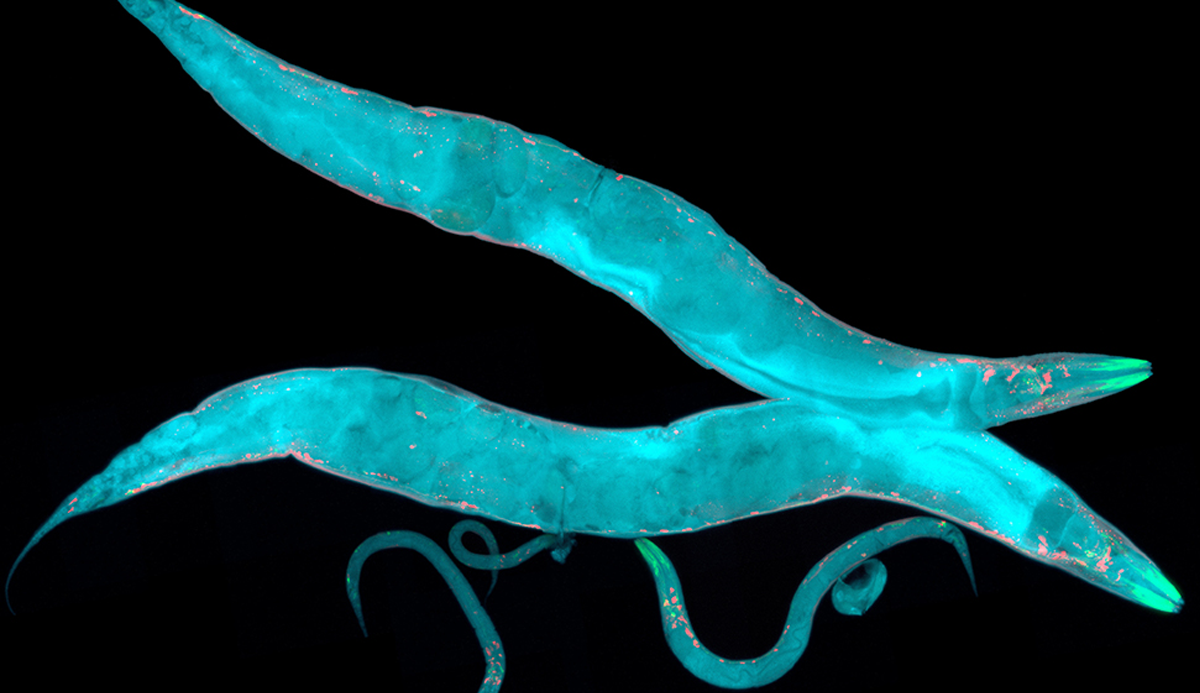
Texas A&M Researchers Engineer Good Bacteria to Aid in Combating Disease
August 25, 2021| |
Good bacteria help the human body maintain health and well-being. Engineering these good bacteria to alter gene activity gone wrong, either by turning them down or activating them, is a promising approach to improve health and fight diseases. Researchers at Texas A&M University have developed a sophisticated, programmable gene silencing system that might have future therapeutic implications.
The researchers have shown that engineered Escherichia coli bacteria could be induced to make gene products to suppress certain traits in Caenorhabditis elegans, a roundworm that consumes E. coli as food. The researchers also noted that in the future, symbiotic bacteria within the human microbiome could be engineered to sense, record, and deliver therapeutics to improve health and wellbeing.
Bacteria have other shorter circular strands of DNA called plasmids. Plasmids replicate and have fewer genes that make them easier to manipulate with genetic tools. Segments of DNA from other organisms, known as transgenes, can be inserted into bacterial plasmids. The researchers inserted a transgene into E. coli's plasmid that can interfere with genetically engineered C. elegans, which has the ability to glow fluorescently green. They then induced the plasmid to express the green fluorescence-suppressing gene. Lastly, they fed the bacteria to C. elegans and found that only those C. elegans that consumed the E. coli with the transgene stopped glowing green.
For more details, read the article in Texas A&M Engineering.
| |
You might also like:
- E. coli Bacteria Offer a Path to Improving Photosynthesis
- Defense Secret of E. coli Revealed
- University of Florida Researcher Develops Genetically Engineered E. coli for Conversion of Plant Residues to Ethanol
Biotech Updates is a weekly newsletter of ISAAA, a not-for-profit organization. It is distributed for free to over 22,000 subscribers worldwide to inform them about the key developments in biosciences, especially in biotechnology. Your support will help us in our mission to feed the world with knowledge. You can help by donating as little as $10.
-
See more articles:
-
News from Around the World
- The Impact of Gene Technology in Animal Agriculture and Food Production
- Texas A&M Researchers Engineer Good Bacteria to Aid in Combating Disease
- Technology Developers Share Commercialization Experiences with Filipino Scientists
- NTU Researchers Identify How Xanthomonas Bacteria Infect Plants
- India Eases Rules for Import of GM Soya Cake, Benefits Farmers
- European Commission Authorizes 10 GM Crops for Food and Feed
- UK Report Compares EU Approaches on Food Safety Regulation of Novel Foods and GMOs with Other Countries
-
Research Highlights
- Plant Immune Sensors Found to Navigate Against Invading Microbes Inside Plant Cells
-
Plant
- MHLW Japan Close to Commercial Approval of the First Genome-edited Fish
- Coalition of NGOs Outline Principles for Responsible Governance of Gene Editing
- Study Finds CRISPR Could Render Mosquitoes Infertile, Reducing Spread of Diseases
- High-oleic Tobacco Seed Oil for Bio-diesel Produced Using CRISPR-Cas9
-
Read the latest: - Biotech Updates (April 17, 2024)
- Gene Editing Supplement (April 10, 2024)
- Gene Drive Supplement (February 22, 2023)
-
Subscribe to BU: - Share
- Tweet

